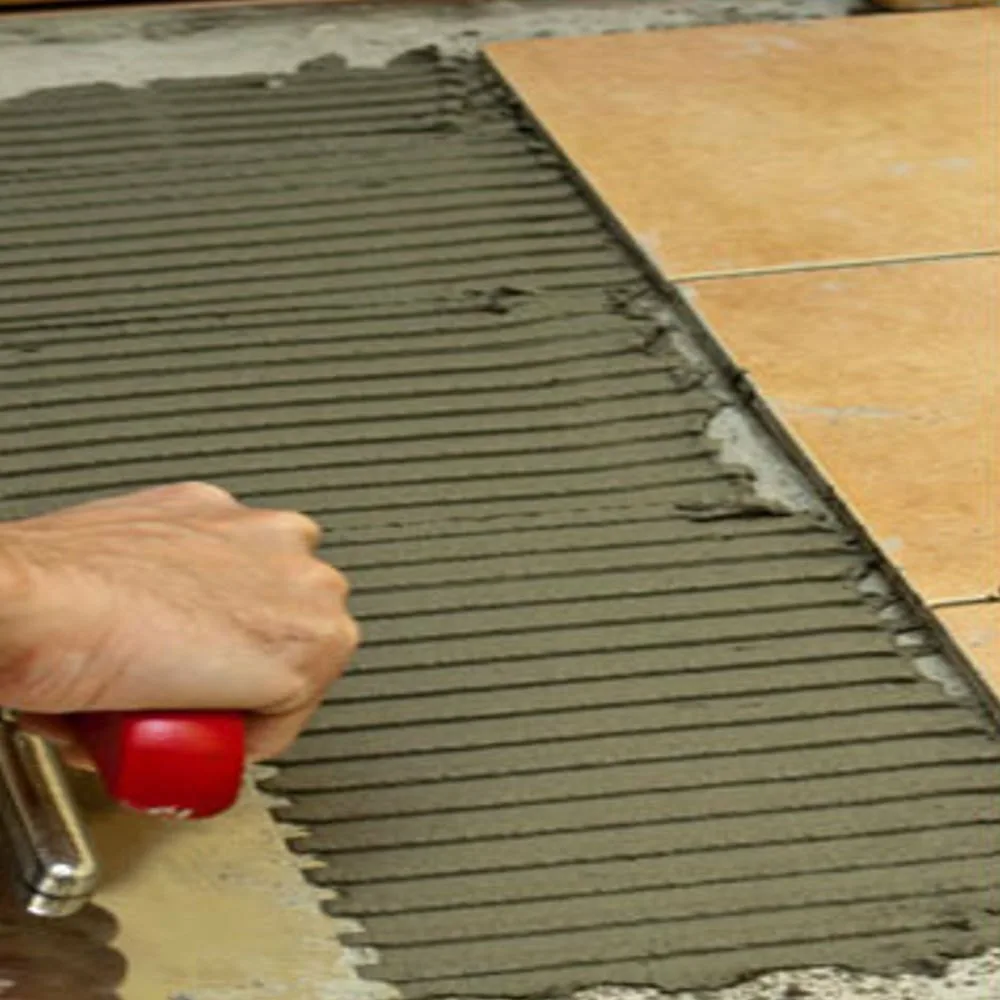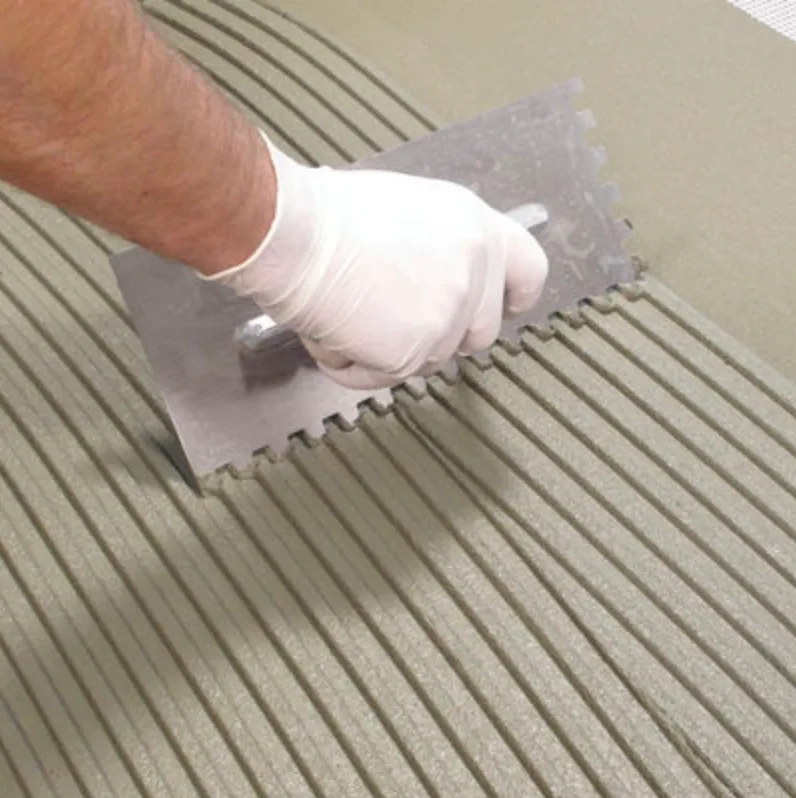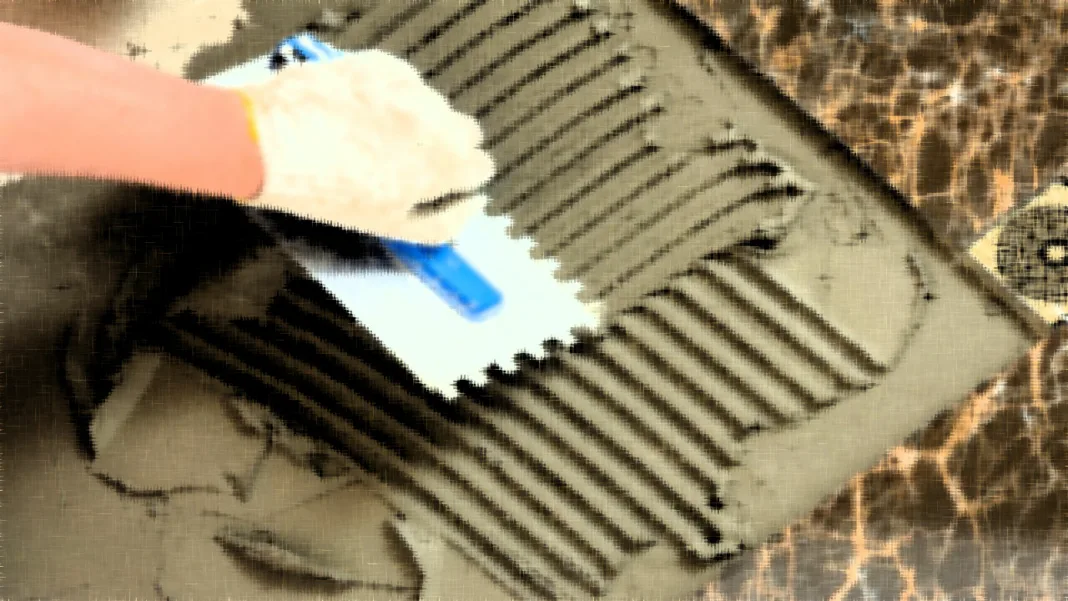Cementitious tile adhesive is a cement-based bonding material used for fixing tiles on various surfaces such as concrete, cement screeds, plaster, and existing tiles. It is formulated with Portland cement, graded sand, and specialized chemical additives that enhance adhesion, flexibility, and workability. These properties ensure a strong, durable bond, providing long-term stability and resistance to environmental factors. Suitable for both residential and commercial applications, cementitious tile adhesives offer superior performance compared to traditional sand-cement mixtures, making them a preferred choice for modern tile installations.
Applications of Cementitious tile adhesive
- Tile Fixing: Used for installing ceramic, vitrified, and natural stone tiles.
- Wall and Floor Tiling: Suitable for both vertical and horizontal surfaces.
- Wet Areas: Ideal for bathrooms, kitchens, swimming pools, and water-prone areas.
- High-Traffic Areas: Applied in malls, airports, commercial buildings, and public spaces.
- Large-Format Tiles: Ensures secure adhesion for oversized and heavy tiles.
- Exterior Cladding: Used for façades, terraces, and balconies.
- Tile-on-Tile Applications: Enables retiling over existing tiles without removal.
- Underfloor Heating Systems: Compatible with heated flooring installations.
Advantages of Cementitious tile adhesive
- Ensures a secure bond between tiles and various substrates.
- Prevents moisture penetration, making it ideal for wet areas.
- Flexibility: Accommodates slight substrate movements, reducing the risk of cracks.
- Minimizes shrinkage, preventing tile debonding over time.
- Provides a smooth, workable consistency for efficient installation.
- Offers long-lasting performance in high-traffic and demanding environments.
- Withstands temperature variations without compromising adhesion.
- Allows retiling over existing surfaces without removal.
- Reduces installation time compared to traditional cement-sand mortar.
- Formulated with low VOC emissions, making it safe for indoor use.

Cementitious tile adhesive types
1. Standard Cement-Based Adhesives
Standard cementitious tile adhesives are basic formulations made of cement, sand, and chemical additives. These adhesives provide a strong bond for ceramic tiles on stable, non-flexible surfaces such as concrete, cement screeds, and plaster. They are primarily used in dry, low-stress environments like residential floors and walls. While cost-effective and easy to use, they have limitations in adhesion strength and flexibility, making them unsuitable for large-format tiles, exterior applications, or substrates that experience movement or temperature fluctuations.
2. Polymer-Modified Cementitious Adhesives
Polymer-modified cementitious adhesives contain added polymers, such as latex or acrylic, which improve flexibility, adhesion strength, and resistance to moisture. These adhesives are ideal for fixing porcelain, vitrified, and natural stone tiles, which have low water absorption and require a stronger bond. The enhanced properties allow their use in areas exposed to moderate movement, temperature variations, and moisture, such as kitchens, balconies, and facades. They provide improved workability, longer open time for adjustments, and are suitable for both indoor and outdoor applications.
3. Fast-Setting Cementitious Adhesives
Fast-setting tile adhesives are specially formulated to cure rapidly, reducing waiting times for grouting and foot traffic. These adhesives are ideal for time-sensitive projects, such as commercial spaces, retail outlets, and renovations where quick turnaround is essential. Their rapid drying properties also make them suitable for installations in cold climates, where slower curing adhesives may delay construction.
4. Flexible Cementitious Adhesives
Flexible cementitious adhesives are designed for applications where minor substrate movement is expected. They contain elasticity-enhancing additives that allow them to accommodate thermal expansion, vibrations, and substrate shifts without compromising the bond. These adhesives are commonly used in underfloor heating systems, high-traffic commercial areas, and exterior facades where temperature variations and structural movements are frequent. Their flexibility also makes them suitable for large-format tiles, which exert more stress on the adhesive layer due to their size and weight.
5. High-Bond Strength Cementitious Adhesives
High-bond strength adhesives are formulated for demanding applications where tiles need a superior level of adhesion to prevent debonding. These adhesives are essential for fixing heavy tiles such as granite, marble, and large porcelain slabs on both floors and walls. They are also recommended for substrates with low porosity, such as existing tile surfaces, glass mosaics, and metal panels. The enhanced bond strength ensures durability and stability, making them suitable for high-rise buildings, industrial areas, and public spaces with heavy footfall.
6. Waterproof Cementitious Adhesives
Waterproof cementitious adhesives are developed for wet and submerged environments, including bathrooms, swimming pools, fountains, and terraces. These adhesives are formulated with hydrophobic additives to prevent water penetration and efflorescence, reducing the risk of tile detachment over time. They also resist fungal growth and alkali reactions, which can occur in constantly damp conditions. Waterproof adhesives ensure a long-lasting bond in moisture-prone areas, making them essential for tiling applications where water exposure is a key concern.

Application method for Cementitious tile adhesive
- Surface Preparation: Ensure the substrate is clean, dry, and level. Apply primer if needed for better adhesion.
- Mixing: Gradually add adhesive powder to water, mix thoroughly until smooth, let it rest, then remix.
- Application: Spread the adhesive evenly using a notched trowel, maintaining the required thickness.
- Tile Fixing: Press tiles firmly into place, use spacers for even gaps, and back-butter large tiles if necessary.
- Adjustments & Cleaning: Align tiles within the open time and remove excess adhesive before it dries.
- Curing & Grouting: Allow 24 hours for curing before and then apply grout to seal the joints.
Conclusion
Cementitious tile adhesives provide strong, durable bonding for a wide range of tiling applications. With enhanced adhesion, flexibility, and moisture resistance, they ensure reliable performance in residential, commercial, and high-traffic areas. Choosing the right type and applying it correctly leads to secure and long-lasting tile installations.





